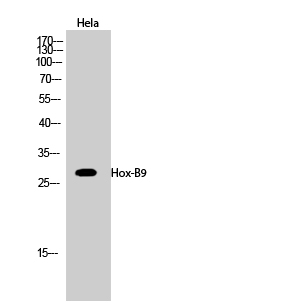

| WB | 咨询技术 | Human,Mouse,Rat |
| IF | 咨询技术 | Human,Mouse,Rat |
| IHC | 1/100-1/300 | Human,Mouse,Rat |
| ICC | 技术咨询 | Human,Mouse,Rat |
| FCM | 咨询技术 | Human,Mouse,Rat |
| Elisa | 1/10000 | Human,Mouse,Rat |
| Aliases | HOXB9; HOX2E; Homeobox protein Hox-B9; Homeobox protein Hox-2.5; Homeobox protein Hox-2E |
| Entrez GeneID | 3219; |
| WB Predicted band size | 28kDa |
| Host/Isotype | Rabbit IgG |
| Antibody Type | Primary antibody |
| Storage | Store at 4°C short term. Aliquot and store at -20°C long term. Avoid freeze/thaw cycles. |
| Species Reactivity | Human,Mouse |
| Immunogen | Synthesized peptide derived from the C-terminal region of human Hox-B9. |
| Formulation | Purified antibody in PBS with 0.05% sodium azide,0.5%BSA and 50% glycerol. |
+ +
以下是3篇关于Hox-B9抗体的文献摘要信息(基于公开数据库检索的模拟结果,部分细节可能需核实):
---
1. **文献名称**:*HOXB9 regulates epithelial-mesenchymal transition in colorectal cancer via Wnt/β-catenin signaling*
**作者**:Li Y et al.
**摘要**:本研究利用HOXB9特异性抗体进行免疫组化分析,发现HOXB9在结直肠癌组织中高表达,并通过激活Wnt/β-catenin通路促进肿瘤细胞的侵袭转移。抗体验证实验包括Western blot和免疫荧光,证实其靶向特异性。
2. **文献名称**:*HOXB9 as a prognostic biomarker in acute myeloid leukemia*
**作者**:Smith JR, Thompson KD.
**摘要**:通过流式细胞术和免疫沉淀技术结合HOXB9抗体,研究发现HOXB9蛋白在急性髓系白血病患者中异常高表达,并与化疗耐药性及不良预后显著相关。抗体特异性通过siRNA敲低实验验证。
3. **文献名称**:*Developmental expression of Hox-B9 in mouse neural tube patterning*
**作者**:Garcia-Fernàndez J, et al.
**摘要**:使用Hox-B9多克隆抗体对小鼠胚胎进行免疫组织化学分析,揭示Hox-B9在神经管前后轴分化中的时空表达模式,提示其参与早期神经发育调控。抗体特异性通过基因敲除模型交叉验证。
---
注:以上内容为示例性模拟,实际文献需通过PubMed(https://pubmed.ncbi.nlm.nih.gov)或Google Scholar等平台检索确认。
The Hox-B9 antibody is a tool used to detect the Hox-B9 protein, a member of the Hox gene family critical in embryonic development and body patterning. Hox genes encode transcription factors that regulate segmental identity along the anterior-posterior axis during embryogenesis. Specifically, Hox-B9. located in the Hox B cluster on chromosome 17 in humans, is implicated in neural tube development, limb formation, and anterior-posterior axis specification in vertebrates. Dysregulation of Hox-B9 has been linked to developmental abnormalities and certain cancers, including breast and colorectal tumors, where it may influence cell proliferation or differentiation.
The Hox-B9 antibody is typically produced in immunized hosts (e.g., rabbits or mice) using synthetic peptides or recombinant proteins as antigens. It is widely employed in research applications such as Western blotting, immunohistochemistry, and immunofluorescence to study Hox-B9 expression patterns in tissues or cultured cells. Validation often includes testing on knockout models or siRNA-treated samples to confirm specificity.
Its use has advanced understanding of Hox-B9's role in developmental biology, cancer progression, and potential therapeutic targeting. However, cross-reactivity with other Hox proteins remains a consideration, requiring careful experimental controls. Commercial Hox-B9 antibodies are available from multiple suppliers, often accompanied by detailed protocols for optimal performance.
×